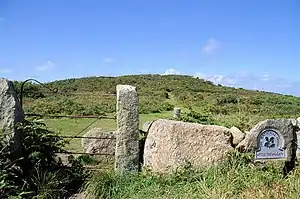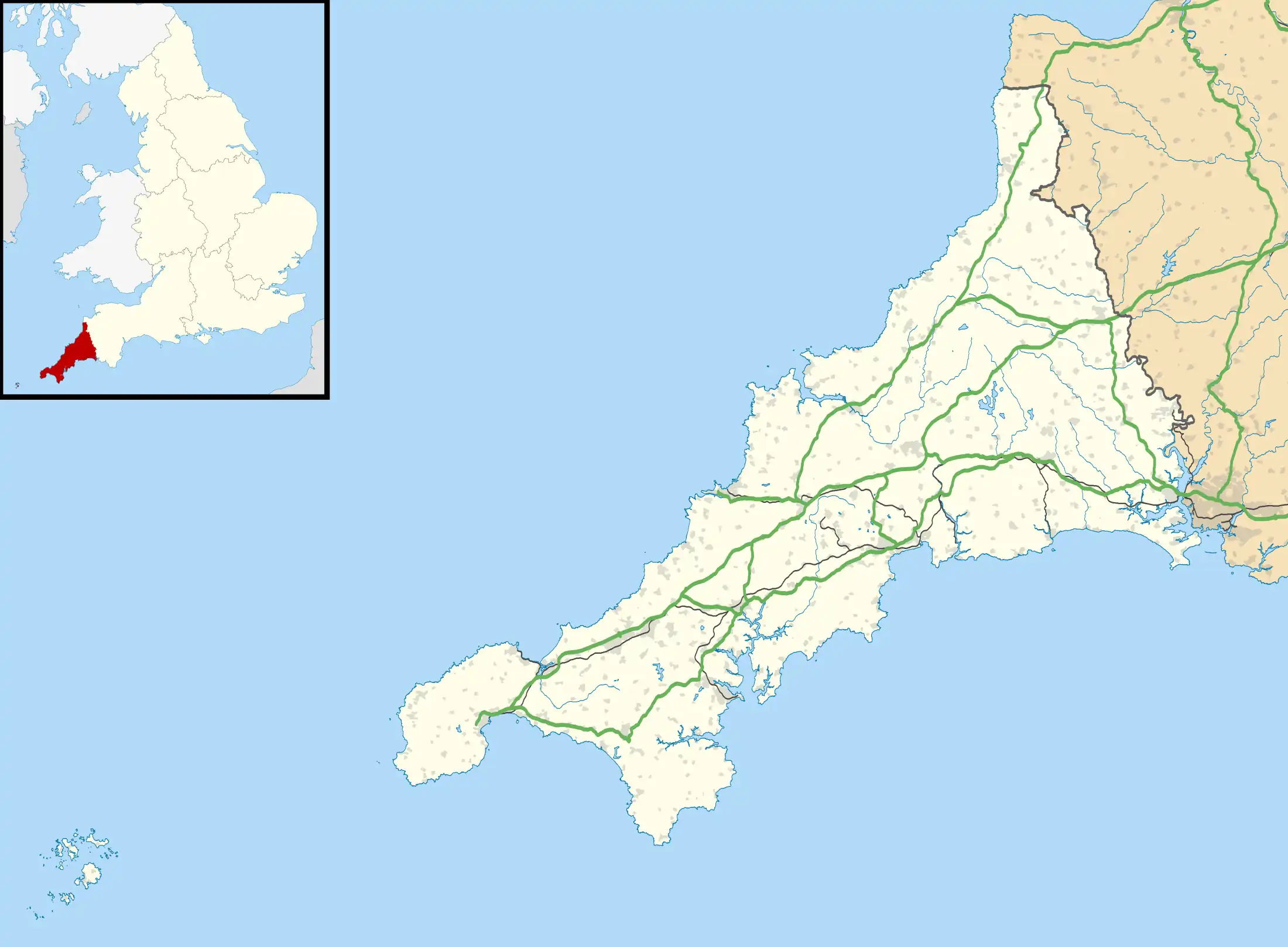
A civil parish is a country subdivision, forming the lowest unit of local government in England. There are 218 civil parishes in the ceremonial county of Cornwall, which includes the Isles of Scilly. The county is effectively parished in its entirety; only the unpopulated Wolf Rock is unparished. At the 2001 census, there were 501,267 people living in the current parishes, accounting for the whole of the county's population. The final unparished areas of mainland Cornwall, around St Austell, were parished on 1 April 2009 to coincide with the structural changes to local government in England.
Population sizes within the county vary considerably, Falmouth is the most populous with a population of 26,767, recorded in 2011, and St Michael's Mount the least with 29 residents. The county is governed by two separate unitary authorities; Cornwall Council covers mainland Cornwall, while the Isles of Scilly are administered by their own unitary authority.
History
Parishes arose from Church of England divisions, and were originally purely ecclesiastical. Over time, they acquired civil administration powers.[1]
The Highways Act 1555 made parishes responsible for the upkeep of roads. Every adult inhabitant of the parish was obliged to work four days a year on the roads, providing their own tools, carts and horses; the work was overseen by an unpaid local appointee, the Surveyor of Highways.[2]
The poor were looked after by the monasteries, until their dissolution. In 1572, magistrates were given power to 'survey the poor' and impose taxes for their relief. This system was made more formal by the Poor Law Act 1601, which made parishes responsible for administering the Poor Law; overseers were appointed to charge a rate to support the poor of the parish.[3] The 19th century saw an increase in the responsibility of parishes, although the Poor Law powers were transferred to Poor Law Unions.[4] The Public Health Act 1872 grouped parishes into Rural Sanitary Districts, based on the Poor Law Unions; these subsequently formed the basis for rural districts.[5]
Parishes were run by vestries, meeting annually to appoint officials, and were generally identical to ecclesiastical parishes,[6] although some townships in large parishes administered the Poor Law themselves. Under the Divided Parishes and Poor Law Amendment Act 1882, all extra-parochial areas and townships that levied a separate rate became independent civil parishes.[7]
Civil parishes in their modern sense date from the Local Government Act 1894, which abolished vestries; established elected parish councils in all rural parishes with more than 300 electors; grouped rural parishes into Rural Districts; and aligned parish boundaries with county and borough boundaries.[7] Urban civil parishes continued to exist, and were generally coterminous with the urban district, municipal borough or county borough in which they were situated. Many large towns contained a number of parishes, and these were usually merged into one. Parish councils were not formed in urban areas, and the only function of the parish was to elect guardians to Poor Law Unions. With the abolition of the Poor Law system in 1930 the parishes had only a nominal existence.[8]
The Local Government Act 1972 retained civil parishes in rural areas, and many former urban districts and municipal Boroughs that were being abolished, were replaced by new successor parishes. Urban areas that were considered too large to be single parishes became unparished areas.[9]
Current position
Recent governments have encouraged the formation of town and parish councils in unparished areas. The Local Government and Rating Act 1997 gave local residents the right to demand the creation of a new civil parish.[10]
A parish council can become a town council unilaterally, simply by resolution. A civil parish can also gain city status, but only if that is granted by the Crown. The chairman of a town or city council is called a mayor.[9] The Local Government and Public Involvement in Health Act 2007 introduced alternative names: a parish council can now choose to be called a community; village; or neighbourhood council.[11]
Within Cornwall, the 2007 Act lead to the abolition of the six district councils and Cornwall County Council, establishing in their place the single unitary authority, Cornwall Council. All civil parish councils became the responsibility of this authority.[9] At the same time, four new civil parishes were created in the St Austell area, parishing the last remaining populated part of the county.[12]
List of civil parishes and unparished area
See also
Notes
- A From 1974 to 2009, mainland Cornwall was divided into districts: Caradon (Cornish: Karadon), formed from Liskeard Municipal Borough, Liskeard Rural District, Looe Urban District, Saltash Municipal Borough, St Germans Rural District and Torpoint Urban District; Carrick (Cornish: Karrek), formed from Falmouth Municipal Borough, Penryn Municipal Borough, Truro Municipal Borough and Truro Rural District; Kerrier (Cornish: Keryer), formed from Camborne–Redruth Urban District, Helston Municipal Borough and Kerrier Rural District; North Cornwall (Cornish: Kernow Gledh), formed from Bodmin Municipal Borough, Bude–Stratton Urban District, Camelford Rural District, Launceston Municipal Borough, Launceston Rural District, Stratton Rural District and Wadebridge and Padstow Rural District; Penwith (Cornish: Pennwydh), formed from Penzance Municipal Borough, St Ives Municipal Borough, St Just Urban District and West Penwith Rural District; and Restormel (Cornish: Rostorrmoel), formed from Newquay Urban District, St Austell Rural District and St Austell with Fowey Municipal Borough
References
- ↑ Angus Winchester, 2000, Discovering Parish Boundaries. Shire Publications. Princes Risborough, 96 pages ISBN 978-0-7478-0470-3
- ↑ RAC Foundation : What Went Wrong? British Highway Development Before Motorways. Retrieved 22 August 2009.
- ↑ The Victorian Web : The Poor Law : Introduction. Retrieved 22 August 2009.
- ↑ Staffordshire University : Poor Law Unions and Registration Districts Archived 14 September 2012 at archive.today. Retrieved 22 August 2009.
- ↑ A Vision of Britain Through Time : Status Details for Rural Sanitary District. Retrieved 22 August 2009.
- ↑ Robert Tittler, The Reformation and the Towns in England, 1998, Oxford University Press, 395 pages, ISBN 978-0-19-820718-4
- 1 2 Modern British Surnames : Selected Events in the History of Civil Registration and Boundary Changes 1801-1996 Archived 1 August 2010 at the Wayback Machine. Retrieved 22 August 2009.
- ↑ Alex MacMorran and T R Colquhoun Dill, The Local Government Act 1894 and the Subsequent Statutes Affecting Parish Councils, 1907, Butterworth and Co, London, 626 pages
- 1 2 3 Office of Public Sector Information : Local Government Act 1972 Archived 5 December 2012 at archive.today. Retrieved 22 August 2009.
- ↑ Office of Public Sector Information : Local Government and Rating Act 1997 Archived 5 August 2012 at archive.today. Retrieved 22 August 2009.
- ↑ Office of Public Sector Information : Local Government and Public Involvement in Health Act 2007 Archived 5 August 2012 at archive.today. Retrieved 22 August 2009.
- 1 2 3 4 5 "Town and parishes to get councils". BBC News Online. 5 December 2008. Retrieved 3 July 2012.
- ↑ "List of Place-names agreed by the MAGA Signage Panel". Place names in the SWF. Cornish Language Partnership. Archived from the original on 15 May 2013. Retrieved 30 January 2013.
- 1 2 3 4 5 6 7 8 9 10 11 12 13 14 A Vision of Britain Through Time : Camelford Rural District. Retrieved 22 September 2010.
- 1 2 3 4 5 6 7 8 9 10 11 12 13 14 15 16 17 18 19 20 21 22 23 24 25 26 27 28 29 30 31 32 33 34 35 36 37 38 39 40 41 42 43 44 45 46 47 48 49 50 51 52 53 54 55 56 57 58 59 60 61 62 63 64 65 Office for National Statistics : Census 2001 : Parish Headcounts : North Cornwall Archived 3 March 2016 at the Wayback Machine. Retrieved 22 September 2010.
- 1 2 3 4 5 6 7 8 9 10 11 12 13 14 15 16 17 18 19 20 A Vision of Britain Through Time : Launceston Rural District. Retrieved 22 September 2010.
- 1 2 3 4 5 6 7 8 9 10 11 12 13 14 15 16 A Vision of Britain Through Time : St Germans Rural District. Retrieved 22 September 2010.
- 1 2 3 4 5 6 7 8 9 10 11 12 13 14 15 16 17 18 19 20 21 22 23 24 25 26 27 28 29 30 31 32 33 34 35 36 37 38 39 40 41 Office for National Statistics : Census 2001 : Parish Headcounts : Caradon Archived 23 December 2015 at the Wayback Machine. Retrieved 22 September 2010.
- 1 2 3 4 5 6 7 8 9 10 11 12 13 14 15 16 17 18 19 20 A Vision of Britain Through Time : Wadebridge and Padstow Rural District. Retrieved 22 September 2010.
- 1 2 3 4 5 6 7 8 9 10 11 12 13 14 15 16 17 18 19 20 A Vision of Britain Through Time : Liskeard Rural District. Retrieved 22 September 2010.
- ↑ A Vision of Britain Through Time : Bodmin Municipal Borough. Retrieved 22 September 2010.
- 1 2 3 4 5 6 7 8 9 10 11 12 13 14 15 16 17 18 19 20 21 22 A Vision of Britain Through Time : Kerrier Rural District. Retrieved 22 September 2010.
- 1 2 3 4 5 6 7 8 9 10 11 12 13 14 15 16 17 18 19 20 21 22 23 24 25 26 27 28 29 30 31 32 Office for National Statistics : Census 2001 : Parish Headcounts : Kerrier Archived 3 February 2015 at the Wayback Machine. Retrieved 22 September 2010.
- 1 2 3 4 5 6 7 8 "The Cornwall (Reorganisation of Community Governance) No. 1 Order 2020" (PDF). Local Government Boundary Commission for England. Archived from the original (PDF) on 24 June 2021. Retrieved 7 July 2021.
- 1 2 3 4 5 A Vision of Britain Through Time : Isles of Scilly Rural District. Retrieved 22 September 2010.
- 1 2 3 4 5 Office for National Statistics : Census 2001 : Parish Headcounts : Isle of Scilly Archived 3 March 2016 at the Wayback Machine. Retrieved 22 September 2010.
- ↑ A Vision of Britain Through Time : Bude–Stratton Urban District. Retrieved 22 September 2010.
- 1 2 3 4 5 6 7 8 A Vision of Britain Through Time : Camborne–Redruth Urban District. Retrieved 20 September 2010.
- 1 2 3 4 5 6 7 8 9 A Vision of Britain Through Time : St Austell with Fowey Municipal Borough Archived 30 September 2007 at the Wayback Machine. Retrieved 22 September 2010.
- ↑ Office for National Statistics : Census 2001 : Usual Resident Population Archived 22 April 2015 at the Wayback Machine Crinnis (part) ward. Retrieved 22 September 2010.
- 1 2 3 4 5 6 7 8 9 10 11 12 13 14 15 16 17 18 19 20 21 22 23 A Vision of Britain Through Time : Truro Rural District. Retrieved 22 September 2010.
- 1 2 3 4 5 6 7 8 9 10 11 12 13 14 15 16 17 18 19 20 21 22 23 24 25 26 Office for National Statistics : Census 2001 : Parish Headcounts : Carrick. Retrieved 22 September 2010.
- 1 2 3 4 5 6 7 8 9 10 11 12 13 14 15 16 17 A Vision of Britain Through Time : St Austell Rural District Archived 1 October 2007 at the Wayback Machine. Retrieved 22 September 2010.
- 1 2 3 4 5 6 7 8 9 10 11 12 13 14 15 16 17 18 19 20 21 22 23 24 Office for National Statistics : Census 2001 : Parish Headcounts : Restormel Archived 3 March 2016 at the Wayback Machine. Retrieved 22 September 2010.
- 1 2 A Vision of Britain Through Time : Newquay Urban District. Retrieved 22 September 2010.
- ↑ A Vision of Britain Through Time : Falmouth Municipal Borough. Retrieved 22 September 2010.
- 1 2 3 4 5 6 7 8 9 10 11 12 13 14 15 16 17 A Vision of Britain Through Time : West Penwith Rural District. Retrieved 22 September 2010.
- 1 2 3 4 5 6 7 8 9 10 11 12 13 14 15 16 17 18 19 20 Office for National Statistics : Census 2001 : Parish Headcounts : Penwith Archived 29 August 2012 at the Wayback Machine. Retrieved 22 September 2010.
- 1 2 A Vision of Britain Through Time : Helston Municipal Borough. Retrieved 22 September 2010.
- 1 2 3 4 5 6 7 8 9 10 A Vision of Britain Through Time : Stratton Rural District. Retrieved 22 September 2010.
- ↑ A Vision of Britain Through Time : Launceston Municipal Borough. Retrieved 22 September 2010.
- ↑ A Vision of Britain Through Time : Liskeard Municipal Borough. Retrieved 22 September 2010.
- ↑ A Vision of Britain Through Time : Looe Urban District. Retrieved 22 September 2010.
- ↑ A Vision of Britain Through Time : Penryn Municipal Borough. Retrieved 22 September 2010.
- ↑ Office for National Statistics : Census 2001 : Usual Resident Population Archived 22 April 2015 at the Wayback Machine Mevagissey (part); and St Ewe (part) wards. Retrieved 22 September 2010.
- ↑ A Vision of Britain Through Time : Penzance Municipal Borough. Retrieved 22 September 2010.
- ↑ A Vision of Britain Through Time : Saltash Municipal Borough. Retrieved 22 September 2010.
- ↑ Office for National Statistics : Census 2001 : Usual Resident Population Archived 22 April 2015 at the Wayback Machine Bethel (part); Gover (part); Mount Charles; and Poltair (part) wards. Retrieved 22 September 2010.
- ↑ Office for National Statistics : Census 2001 : Usual Resident Population Archived 22 April 2015 at the Wayback Machine Crinnis (part); and St Ewe (part) wards. Retrieved 22 September 2010.
- ↑ A Vision of Britain Through Time : St Ives Municipal Borough. Retrieved 22 September 2010.
- ↑ A Vision of Britain Through Time : St Just Urban District. Retrieved 22 September 2010.
- ↑ A Vision of Britain Through Time : Torpoint Urban District. Retrieved 22 September 2010.
- ↑ A Vision of Britain Through Time : Truro Municipal Borough. Retrieved 22 September 2010.
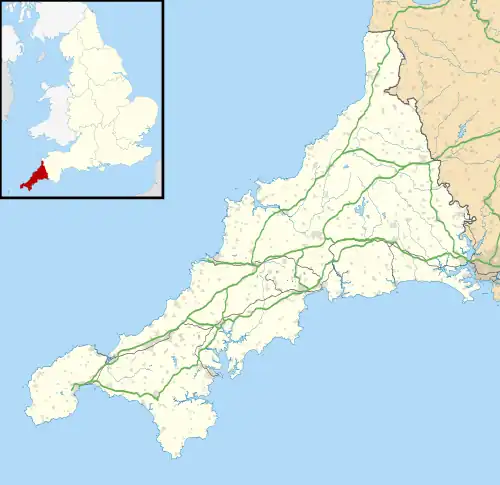






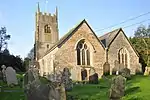















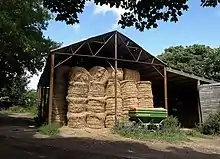


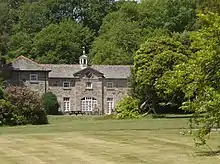


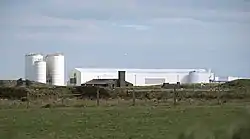
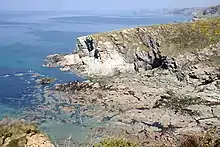

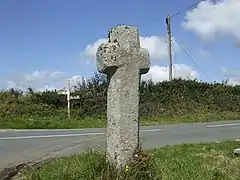






















_Castle_-_geograph.org.uk_-_407228.jpg.webp)
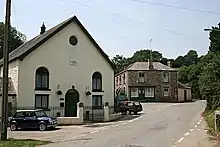













































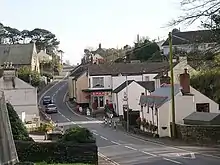





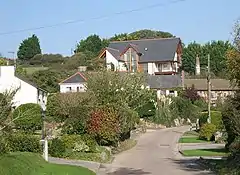



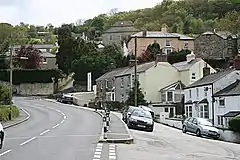














































_-_geograph.org.uk_-_529723.jpg.webp)


























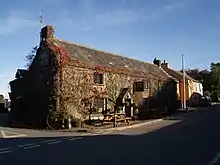

_-_geograph.org.uk_-_56436.jpg.webp)






